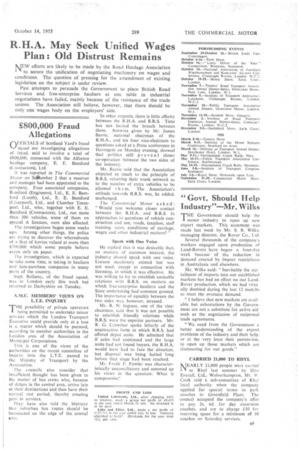R.H.A. May Seek Unified Wages Plan: Old Distrust Remains
Page 43

If you've noticed an error in this article please click here to report it so we can fix it.
NEW efforts are likely to be made by the Road Haulage Association to secure the unification of negotiating machinery on wages and conditions. The question of pressing for the amendment of existing legislation on the subject is under review.
Past attempts to persuade the Government to place British Road Services and free-enterprise hauliers at one table in industrial
negotiations have failed, mainly because of the resistance of the trade unions. The Association still believe, however, that there should be only one wages body on the employers' side.
In other respects, there is little affinity between the R.H.A. and B.R.S. Time has not healed the breach between them. Answers given by Mr. James Barrie, national chairman of the R.H.A., and his four vice-chairmen to questions asked at a Press conference in Harrogate on Monday evening, showed that politics still prevent closer co-operation between the two sides of the industry.
Mr. Barrie said that the Association objected as much to the principle of B.R.S. retaining their trunk network as to the number of extra vehicles to be allowed t h em. The Association's attitude towards B.R.S. was, he added, unchanged.
The Commercial Motor asked: "Would you welcome closer contact between the R.H.A. and B.R.S. in approaches to questions of vehicle construction and use, roads, taxation, staff training, rates, conditions of carriage, wages and other industrial matters? "
Speak with One Voice
He replied that it was desirable that, on matters of common interest, the industry should speak with one voice. Liaison machinery existed but was not used, except in connection with licensing, in which it was effective. He was willing to try to establish amicable relations with B.R.S. on matters on which free-enterprise hauliers and the State undertaking had common ground. The importance of equality between the two sides was however, stressed.
Mr. R. N. Ingram, one of the vicechairmen. said that it was not possible to establish friendly relations while B.R.S. were the superior partners. Mr. R. G. Crowther spoke bitterly of the unattractive form in which B.R.S. had offered depot units. He admitted that if sales had continued and the large units had not found buyers, the R.H.A. would have had to face the situation, but disposal was being halted long before that stage had been reached.
Mr. Frank F. Fowler was characteristically unconeiliatory and summed up his views in the question: What is compromise




















































































































